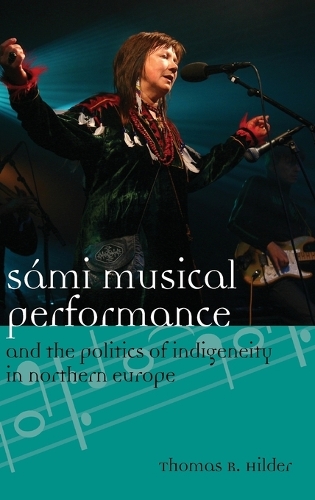
Smi Musical Performance and the Politics of Indigeneity in Northern Europe
(Hardback)
Publishing Details
Smi Musical Performance and the Politics of Indigeneity in Northern Europe
By (Author) Thomas Hilder
Bloomsbury Publishing PLC
Rowman & Littlefield Publishers
16th October 2014
United States
Classifications
Professional and Scholarly
Non Fiction
Social and cultural anthropology
Indigenous peoples / Indigeneity
Theory of music and musicology
781.629457
Physical Properties
Hardback
262
Width 163mm, Height 240mm, Spine 25mm
503g
Description
The Smi are Europes only recognized indigenous people living across regions of Norway, Sweden, Finland and the Russian Kola peninsula. The subjects of a history of Christianization, land dispossession, and cultural assimilation, the Smi have through their self-organization since World War II worked towards Smi political self-determination across the Nordic states and helped forge a global indigenous community. Accompanying this process was the emergence of a Smi music scene, in which the revival of the distinct and formerly suppressed unaccompanied vocal tradition of joik was central. Through joiking with instrumental accompaniment, incorporating joik into forms of popular music, performing on stage and releasing recordings, Smi musicians have played a key role in articulating a Smi identity, strengthening Smi languages, and reviving a nature-based cosmology. Thomas Hilder offers the first book-length study of this diverse and dynamic music scene and its intersection with the politics of indigeneity. Based on extensive ethnographic research, Hilder provides portraits of numerous Smi musicians, studies the significance of Smi festivals, analyzes the emergence of a Smi recording industry, and examines musical projects and cultural institutions that have sought to strengthen the transmission of Smi music. Through his engaging narrative, Hilder discusses a wide range of issuesrevival, sovereignty, time, environment, repatriation and cosmopolitanismto highlight the myriad ways in which Smi musical performance helps shape notions of national belonging, transnational activism, and processes of democracy in the Nordic peninsula. Smi Musical Performance and the Politics of Indigeneity in Northern Europe will not only appeal to enthusiasts of Nordic music, but, by drawing on current interdisciplinary debates, will also speak to a wider audience interested in the interplay of music and politics. Unearthing the challenges, contradictions and potentials presented by international indigenous politics, Hilder demonstrates the significance of this unique musical scene for the wider cultural and political transformations in twenty-first-century Europe and global modernity.
Reviews
Thomas R. Hidler provides a critical analysis of the political, cultural, and social transformations in the non-Western, Nordic, Smi indigenous community. . . .This book is well-written and organized cohesively, as one chapter leads seamlessly into another. It will be a valuable addition to the fields of European studies, ethnomusicology, and identity studies. * Journal of Folklore Research *
This fundamental book, rich in information, insight, and interpretation, is long overdue. . . .This study is written with respect: it is based on long-term engagement with Smi musicians and music events, learning appropriate languages, and listening carefully to contemporary Smi concerns. Hilders book is a must for those studying the Smi. It is also insightful reading for those interested in the politics of indigeneity and music. * Yearbook for Traditional Music *
Author Bio
Thomas Hilder is an ethnomusicologist with a focus on music of the Nordic countries and a special interest in the politics of transnationalism, postcolonialism, and gender. His research on the Smi has been published in Ethnomusicology Forum, and he is lead editor of the forthcoming book Music, Indigeneity, Digital Media. He currently works as a postdoctoral researcher at the Center for World Music, University of Hildesheim, Germany.
